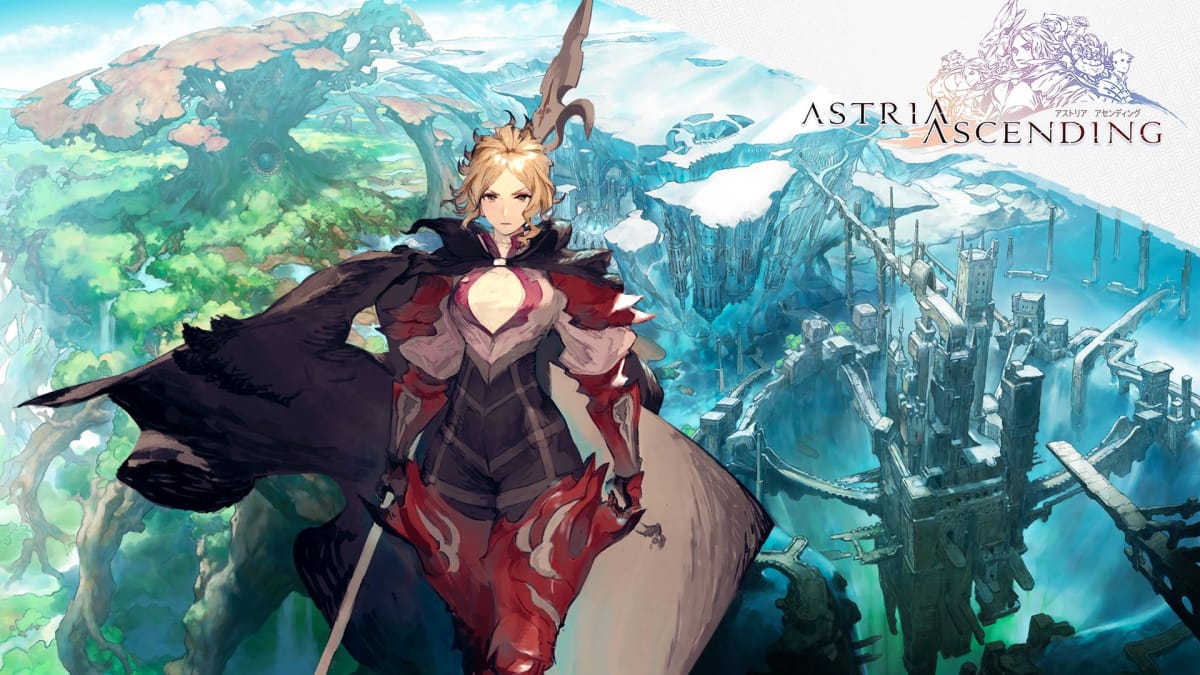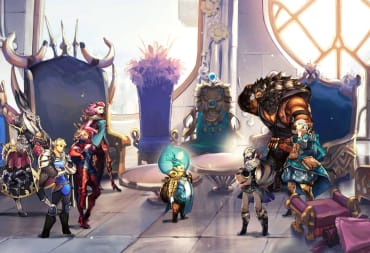As a JRPG aficionado, I’ve played my fair share of pickings from what the genre has to offer. Astria Ascending caught my eye and seemed like a painting that had come to life. It had some big names attached to it like Kazushige Nojima and Hitoshi Sakimoto who’d previously worked on Final Fantasy. Plus, a high-fantasy setting? I was sold. At least for the time being that is. After that, things went down a slippery slope.
Astria Ascending 1 Minute Video Review
Astria Ascending takes place in the world of Orcanon, a multi-cultured land comprising 5 cities and various species. Its defenders are 8 demigods, with Ulan as their leader. They’ve been unwillingly chosen to protect the world’s harmony and burdened them with a shortened lifespan. With only 3 months left to live at present, the demigods must maintain the land’s balance by defeating ‘the noise’.
It’s a set-up that sounds interesting on paper with time running out for all the characters, but the execution is terribly flat. We’re introduced to all 8 demigods from the very beginning, meaning we don’t get the time to get acquainted with them from the very beginning. Instead, as we progress with our travels, we get to know about each of their backstories and the place they’re originally from. We also get to know more about their personal plight of being a chosen demigod.
While normally I’m someone who gets very invested in a game’s lore and all its characters, Astria Ascending managed to be a first for me and made me want to skip all of the game’s dialogue (which by the way, I couldn’t do because the game makes you sit through it until the line gets over). For a number of reasons, I could not bring myself to care about any of the party members. The first one being the fact that we’re thrust into the game with all 8 members to choose from and make a party of 4 of, making it pretty overwhelming from the get-go. Instead of focusing on the who’s who I tried to learn about who could do what and how I should build my party. By the time we were to experience the backstories I thought "Oh, that's a bummer. Well, onward!" Adding on to that was the fact that each character's story didn't seem to add anything of consequence further on in the game.
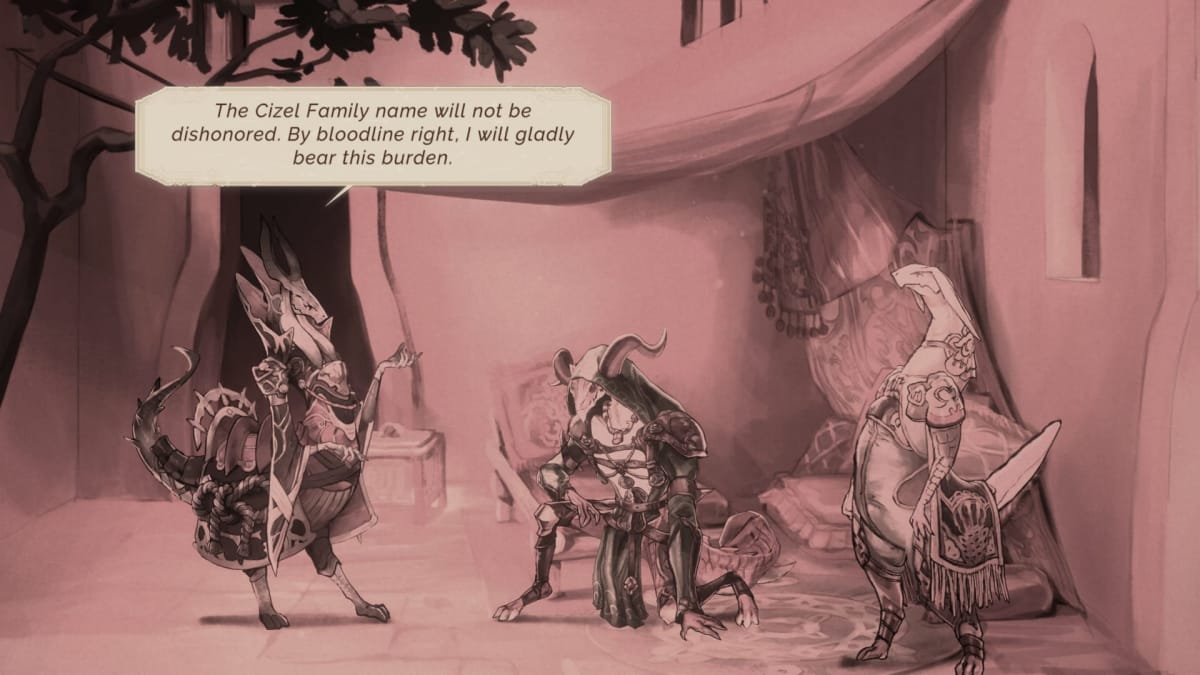
Voice Acting in Astria Ascending
The second being the hit or mostly-miss voice acting. While the game gives you the option to choose between the Japanese and English voiceover, I like to usually stick with the English voiceover for video games. The demigods’ leader herself, Ulan, sounded the least leader-like and had zero conviction whatsoever in her voice, making it an absolute snooze to listen to. On the other hand, however, there was Dagmar, a beefy sorcerer who had the perfect gruffness to his voice for his sort of character. In addition, there were a number of inconsistencies with pronunciations of certain in-game names for characters and cities alike.
Eventually, I switched to the Japanese voice acting to see if it was more bearable that way, and for a while it was, but it also made me realize that the translation was just too awkward. Not just the normal conversation between the characters, but also their phrases during battle. A lot of them were poorly matched to what was going on in battle. A character could say ‘Why?!’ and an enemy would have just been killed off. In retrospect, it was pretty funny, but it’s a glaring issue that’s noticeable every time you head off into a fight.
I didn't really feel a sense of camaraderie between the party members either. Even worse, they end up throwing racist comments at one another, not even playful jabs, and these aren't even addressed by the other party members. Ulan never does anything to stop them. At one point, when someone close to one of the party members dies in front of them, none of them express any sorrow. It makes them seem non-humane and disconnected from each other's struggles as well as of the people of the land they're protecting.
The enemies encountered also seemed far too generic and had lackluster motives. A lot of the world's lore was also grazed over and barely explored. Overall, a story that had potential but was extremely non-compelling.
Astria Ascending Combat and Gameplay
Gameplay in Astria Ascending is a bit all over the place. The combat is turn-based, there’s light platforming, a job system, a skill point system, sub-quests, and also a card game? Boy, there’s a lot to unpack.
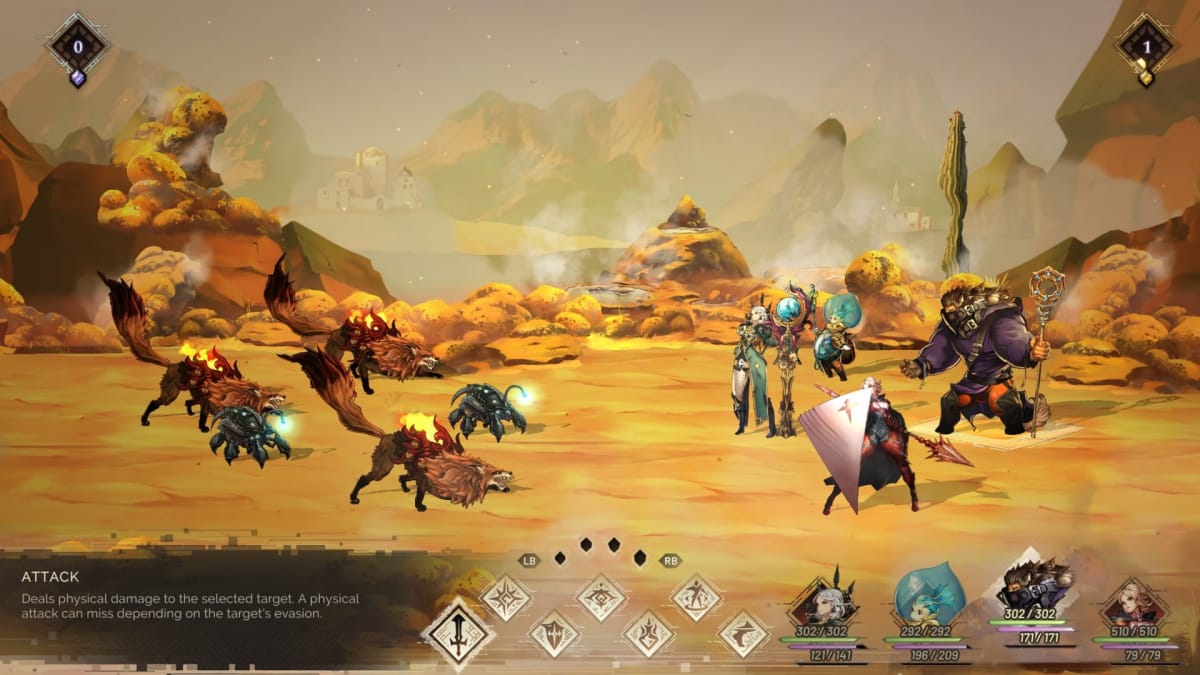
Astria Ascending’s combat is one of its stronger points. It relies on traditional turn-based combat with a little flair thrown into it. Along with your Health Points and Magic Points are your Focus Points, points that can be spent to give a boost to your attacks and abilities. The likes of this have been seen before in both Octopath Traveler and Bravely Default, so it’s not entirely unique. They seemed a bit unnecessary at first but proved to be vital after defeating the small fries early on in the game. You can also cause bonus damage to enemies if you can figure out their elemental weaknesses.
The combat does, however, need some quality-of-life improvements. An indicator for the turn order would have been pretty handy, as at some points it seemed like the enemy’s turn would never get over. An option to increase the battle speed would also have been nice. Most of all, a transition into battle that didn’t make my head spin every time was of dire need.
The platforming the game has is mainly seen in the game’s dungeons. I found this additional layer of gameplay to be overkill for the most part. There are puzzles here and there but they’re fairly easy to solve. There are chests hidden away in nooks and crannies but besides that, there’s not much to keep an eye out for. What struck me as odd was the fact that despite there being platforming, there were no consequences if you fell and died. You’d just respawn to the exact same spot, not even the last save point you’d crossed, and you wouldn’t lose anything in the process either. It made me wonder what the point of having platforming was even for.
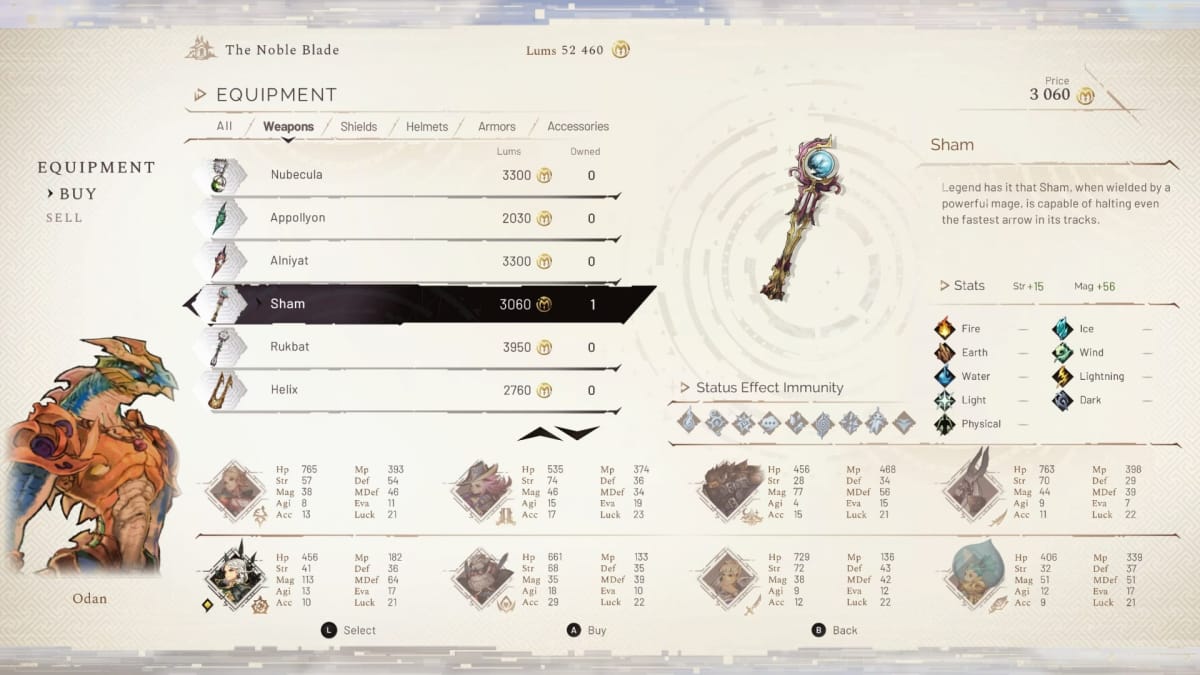
Characters can unlock new skills through, what I can only put as, a skill constellation rather than a skill tree. Various skills are laid out as a bunch of stars, presumably to go with the Zodiac theme that’s prevalent in the game. You can unlock these through skill points and skill orbs, and I’ve gotta say, being able to unlock more of them was probably the most exciting part of the game. That’s not saying a lot.
Things became a bit more interesting after the job system was unlocked, but even that’s a bit convoluted. There’s the base job, the main job, the sub job, and the support job. All of this is sort of info-dumped once we unlock the job system, so I became a bit cross-eyed trying to keep up with all of it. The sub job and support job could be built upon through the side quests, but I honestly did not bother much with those.
And finally J-ster (pronounced jester), the card game à la Triple Triad from Final Fantasy VIII. It’s a pretty popular game in Orcanon, considering you can challenge just about every NPC to it. While I played the game in the tutorial and played one other game with an NPC, that was about it. It didn’t really add much value other than expanding the tokens you could put forward in J-ster. No power-ups, no special gear you could obtain, nothing.
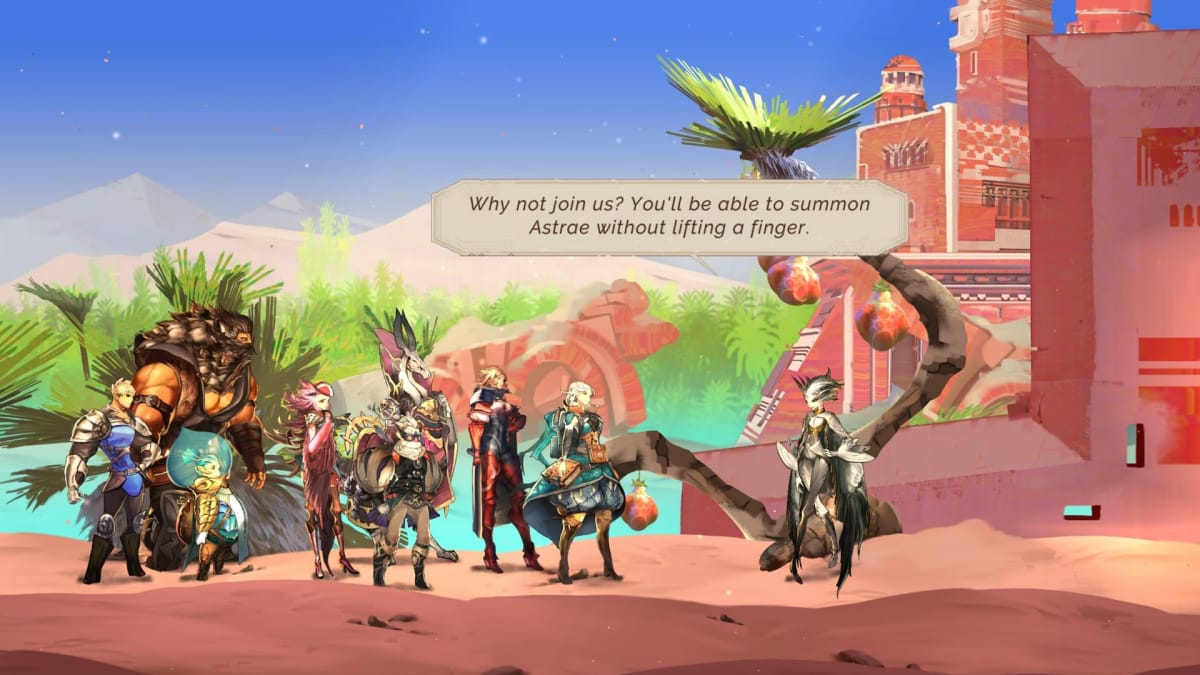
Astria Ascending's Music Hits a High Note
What takes the cake are the game's visuals and music. The gouache painting-like landscapes are a sight to see, and although they’re still backgrounds, there’s clearly a lot of detail and thought that’s been put into them. The character designs are equally splendid (although clearly, the artist has a thing for ‘thicc’ thighs), but the animation for them is a bit questionable. I found myself thinking ‘Why?!’ upon seeing the anime boob jiggle physics on Ulan’s sprite. Strangely enough, the jiggle physics are only on Ulan.
The music by Hitoshi Sakimoto is a treat, and there’s little to complain about on that front. The little clicks and clinks that you can hear in the UI and menu screens are also oddly satisfying. I could stay on the skill constellation map going back and forth all day just to hear the sound effects.
Astria Ascending Review - Final Thoughts
Astria Ascending held a lot of promise, but there’s a weird cacophony of elements going on with it. It seems like the game's trying to cram every possible mechanic it can, but none of them are up to the mark. It’s got flaws, and they’re definitely not the kind that can be fixed with a few patches. That being said, it’s not the worst JRPG out there that you can play, but it certainly leaves a lot to be desired.
TechRaptor reviewed Astria Ascending on PC with a code provided by the publisher. The game is also available on Nintendo Switch, PlayStation 4/5, and Xbox One/Series X/S.
Review Summary
Pros
- Pretty Visuals
- An Easy-on-the-Ears Soundtrack
- Better Than Your Average Turn-Based Combat
Cons
- Bland Characters
- Unnecessary Gameplay Mechanics
- Stiff Voice Acting and Awkward Dialogue
Have a tip, or want to point out something we missed? Leave a Comment or e-mail us at tips@techraptor.net
